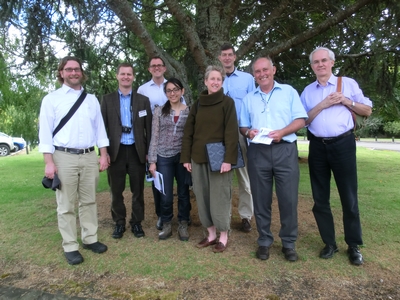Carbon monitoring in New Zealand attracts international interest

New Zealand is able to use carbon stored by forests to offset a large portion of our national greenhouse gas emissions. This offsetting has been made possible though robust carbon modelling and inventory methods for assessing carbon stocks in planted and indigenous forests.
Planted forests play a vital role in helping New Zealand to meet our national obligations under the Kyoto Protocol. This position sets us apart from many other developed countries that do not include forests in their emission trading schemes (ETS).
The largest ETS in the world, run by the European Union (EU) does not include carbon credits from forests, because of concerns about the difficulty and cost of quantifying carbon accurately enough. A group of visitors representing major forestry interests in Europe recently visited Scion to learn how New Zealand has met this challenge.
Leading the group was Jason Funk, Land Use and Climate Scientist from the United States Environmental Defense Fund. He said the purpose of the tour was to explore the work that New Zealand has done in bringing legitimate forest credits into the ETS – something that is not yet allowed in the EU ETS.
“One of the key questions for the group was: what kind of measurement system is necessary to ensure high levels of accuracy and confidence in forest carbon measurements?” Jason explained. “New Zealand is well advanced in this area and Scion is at the forefront of this technology.”
Dr Jason Funk of the US Environmental Defense Fund pictured at far left with EU delegates representing forestry interests. From left to right: Dr Georg Erlacher (European State Forest Association Chair), Dominic Marcellino (US), Mariana Deheza (France), Susan Braatz (Forest & Agriculture Organisation of United Nations - FAO), Constantin von Waldthausen (Germany), Dr Peter Beets (Scion), Jan Haino (Finnish Ministry of Agriculture and Forestry).
Want to know more about carbon models?
Contact: Show email

